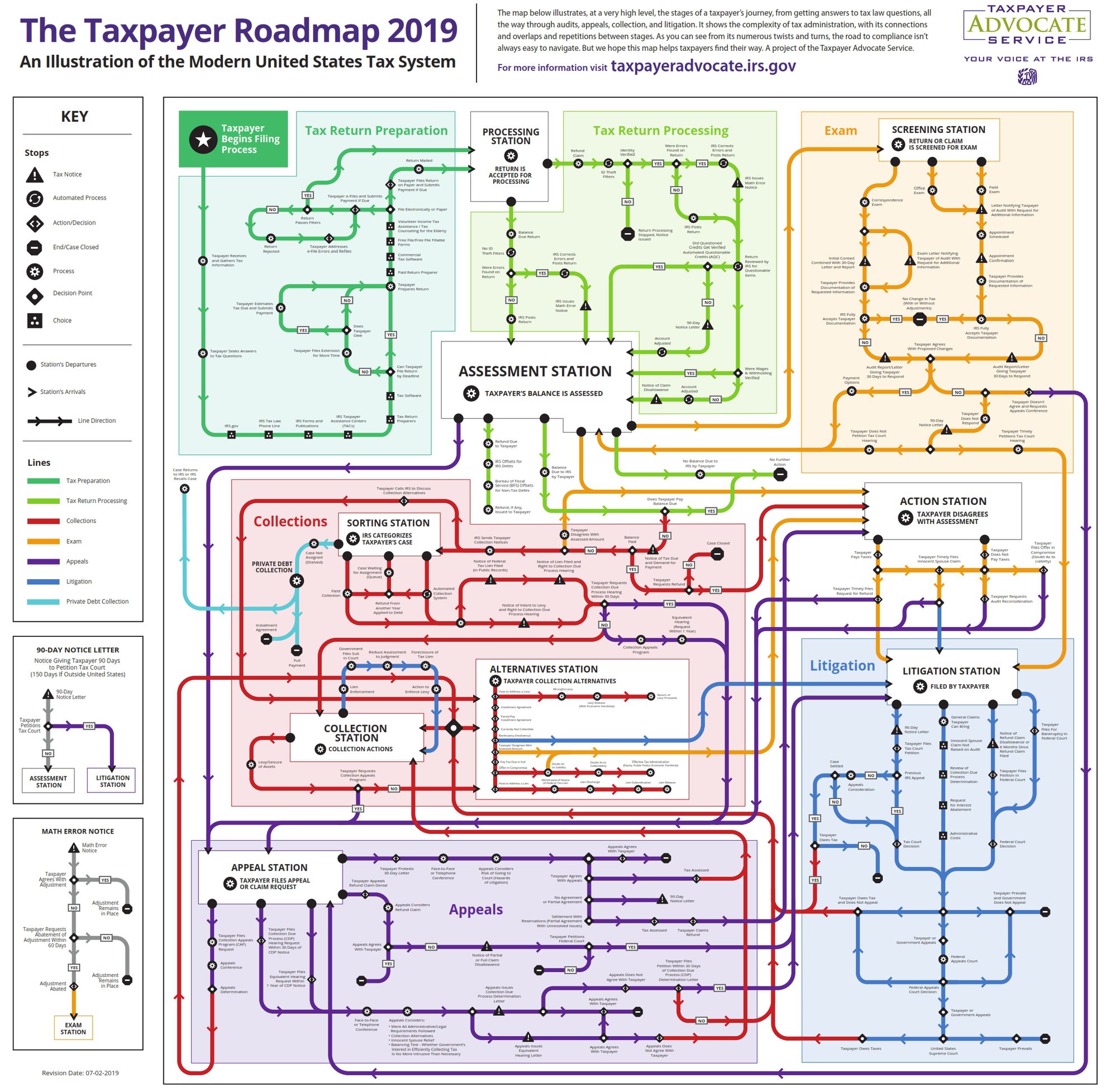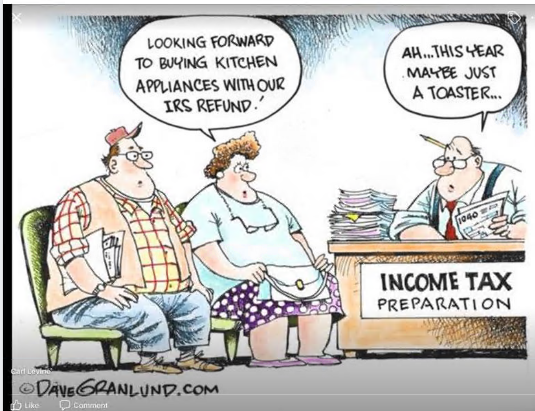I mentioned in the last post and the one before that that during tax season we require a non-refundable deposit at the time of your intake appointment. Some of you may be wondering why we do that. The short answer is that one tax season I got burned by several “clients.” They came in during season to have their taxes prepared and when they didn’t like the results or didn’t like the amount of follow up and due diligence I was doing they decided to go elsewhere. This was after I had already done a lot of work on their returns. So 1) I was not paid for my time and 2) I was not able to take on clients who really did want to work with me. Lesson learned.
“Onboarding” makes the process sound super complicated, but it really isn’t. All paid preparers have to do a certain amount of due diligence for each tax client. At a minimum we have to check your ID to ensure you are who you say you are and collect the information necessary to prepare your tax returns. At a new client intake appointment (what happens when you get onboarded during tax season) we do the following:
- ID Check for taxpayers and dependents
- Engagement Letter & Privacy Policy Signed
- Notice Assurance Program Opt In or Out
- Client Interview & Question/Answer Session
- Basic Review of Prior Year Returns
- Collect your W2s, 1099s, and other information needed to prepare your return
- Send you home with a list of missing items and information
During the off season I am happy to meet with potential clients and do an ID check, return review, and basic client interview for free. I am happy to spend some time discussing your needs and expectations.. We then send you a reminder at the beginning of tax season to request an organizer. In the meantime, if you have found someone else or have decided to do your own taxes and don’t call for the organizer, it’s not really a problem. We are sorry we didn’t earn your business, but we understand.
During tax season we are less understanding. The preliminary work required to bring in a new client takes 30 minutes to an hour (sometimes more if the tax situation involves a business or complex investments). During tax season our work time is limited and much more valuable (it’s like surge pricing for Uber). So, if we are going to spend the time getting to know you and your situation we want to make sure that you are serious enough about having us prepare your tax returns that you get all the way through the e-filing process and that if you don’t we still get paid for the time spent processing your return.
I’ve said it before but it bears repeating. Tax Therapy is a small business and this is how I earn my living. I appreciate the opportunity to show you just how valuable a good #taxpro can be but to make my business work, I have to stick to the processes and policies that work for me. Right now we are still accepting new clients with a non-refundable deposit. If you are still looking for a #taxpro and would like to schedule an intake appointment please get in touch!
Still shopping for a #taxpro? Give #TaxTherapy a call!
Are you thinking of going from doing it yourself with box software to hiring someone to help you? Did your preparer from last year retire? Get indicted? Die? Hey! It happens!
Right now we are still taking appointments for potential clients who are evaluating their options. We will be doing this for a few more weeks.
It’s kind of a moving target, but once tax season really gets going (usually shortly after e-filing for individuals opens) we can’t provide appointments for people who are not sure about having us do their tax returns. We will still take new clients (but we have a flexible deadline for that as well) but we will require a non-refundable deposit to schedule an intake appointment and before we start processing your returns.
I know it seems really early but at Tax Therapy the needs of our existing clients are always given top priority. We are a small office (it’s just me and Cat) and we want to make sure that we can do a great (thorough and accurate) job on all of the returns we have in process and expect to have come in during tax season. By the time March 10th rolls around I’m already looking toward moving returns out of the office, rather than bringing them in. And by March 20th or so I’m already making plans for summer notice clinics, extension season, and next filing season!
I answered a few calls last year from people who seemed to really want me to do their taxes but needed to get in right now. That’s just not how this office (and many other small offices work). When I suggested to one such caller that they visit one of the many large franchises in the immediate area, they didn’t want to do that. Unfortunately, if you wait until late March to try to find someone to “do your taxes” that may be your only option. And it isn’t a bad option! Large tax franchises are set up and staffed to meet the immediate needs of most new clients. Most small tax practices are not. So evaluate your needs and if you want to #shoplocal and #shopsmall then you need to shop now!
Are you ready?! We are. Reminder postcards for returning clients and new clients who onboarded over the summer and fall will be mailed tomorrow. On Monday, Cat will be here to start answering calls and e-mails and getting organizers delivered. The organizer contains our annual engagement letter, a copy of our privacy policy, and an interview and other supplemental forms to help you remember and collect all of the information we need to do your tax returns!
If you are reading this and are still looking for a #taxpro, I am still taking “shopping” appointments. Once tax season really gets going though I don’t have the availability to meet with anyone except new and returning clients. If you’re sure here is where you want to be then I’m happy to bring you in as a new client during tax season but I do require a non-refundable deposit to do your onboarding and accept your information for processing. If you aren’t sure or have any questions feel free to call or e-mail the office. We are happy to help.
The IRS is opening e-filing for business returns soon and e-filing for individual returns will open a couple of weeks after that. Here at Tax Therapy we are about ready to open our season for new and existing clients. Existing clients will receive a reminder postcard and e-mail letting them know that they can call to request their annual tax organizer (engagement documents & client interview). New clients can call to get an organizer and set up a new client intake appointment. Please note that new clients coming in during tax season (as opposed to during the summer and fall) must pay a non-refundable deposit equal to the base price of a federal Form 1040 before we will accept their return for processing.
And it’s a doozy! Every year Kelly Phillips Erb (a.k.a. The Tax Girl) posts a list on Forbes.com of the Top 100 Must-Follow Tax Twitter Accounts. For 2020, I’m on it! Mostly this list is for tax professionals (nerds) rather than taxpayers but it is an honor to be included and as you can see, I’m really excited!
I’m also excited that tax season is basically here. I am still accepting new clients. Cat will be ready to send out preliminary paperwork starting the week of January 13th. I will start processing paperwork the following week. That is also the week I expect that the IRS will open e-filing for the 2020 tax season. So if you are looking for a #taxpro, please get in touch.
For most taxpayers once the balance due is paid or the refund comes in they stop thinking about taxes. This article provides a great explanation about why tax time is the worst time to ask the important questions or to try to find a new taxpro. In general, if the year holds “potentially taxable events” for you (marriage, children, retirement, college, lost job, new job or promotion, buying or selling business property) the time to start planning is now, not January! The same thing goes if you are considering changing from a DIY option to hiring a #taxpro or switching #taxpros.
Most #taxpros spend November and December installing and testing our software and doing refresher classes on tax law changes. Plus, most of us also have lives outside of the office and like to spend at least some of the holiday season with our friends and families! In January those of us who also offer bookkeeping and payroll services are busy doing end of the year close out work and preparing W2s and 1099s. Even those of us who don’t offer bookkeeping and payroll are usually busy getting ready for tax season: updating engagement letters, refining our client interview process, updating office policies and processes, training new staff, etc. By February we are working on returns (returns for partnerships and S-corporations are due on March 15th, not April 15th!). By March, when many taxpayers start to feel the deadline approaching and decide it’s time to “do their taxes” #taxpros are slammed with work. Many of us are not accepting new clients or, if we are accepting we will require you to go on extension. If you call us on or after April 1st looking to come in as a new client 1) we will hate you (we are totally burned out by the end of March), 2) we may laugh at you (but we don’t really think your request is funny), 3) we are going to either insist you go on extension or refer you to a shop (often one of the large franchises) who is set up to handle last minute walk ins. Note: Yes, we do consider two weeks before the filing deadline “last minute.” By April 1st (and, no, we don’t think the tax-related April Fool’s Day pranks are funny either—please don’t call saying you are being audited or levied if you aren’t) we are almost completely focused on getting returns out of our offices, not bringing them in. We are adding last minute documents to mostly completed returns. We are booking review and signature appointments. We are even planning for next filing season. We are rarely actively looking for new business.
 The best time to find a #taxpro is actually summer through early fall. We have had a chance to recover from the April 15th deadline push. We may be busy working on returns on extension (especially if it is close to the September 15th deadline for partnerships and S-corps or the October 15th deadline for individual returns) but typically we are less busy than during the first part of the year. We will have time to review your situation thoroughly, answer what questions we can at your initial consultation, research questions for which we don’t have the answers, and we can give you an idea of our office process and what to expect and the documents we will need to complete your returns. It’s much less hectic and, at least in my office, a bit less formal when new clients come in for “onboarding” during the summer. You will also have a much wider range of appointment times available because existing clients for the most part don’t book appointments in the summer unless they are having a “taxable event”. So, whether you are an existing client ready to do some tax planning or a potential client wanting to find out more about the office, the time to call or e-mail is now! Give us a call at 505-352-0058 or send us an e-mail at info@taxtherapy505.com and we will be happy to schedule a consult.
The best time to find a #taxpro is actually summer through early fall. We have had a chance to recover from the April 15th deadline push. We may be busy working on returns on extension (especially if it is close to the September 15th deadline for partnerships and S-corps or the October 15th deadline for individual returns) but typically we are less busy than during the first part of the year. We will have time to review your situation thoroughly, answer what questions we can at your initial consultation, research questions for which we don’t have the answers, and we can give you an idea of our office process and what to expect and the documents we will need to complete your returns. It’s much less hectic and, at least in my office, a bit less formal when new clients come in for “onboarding” during the summer. You will also have a much wider range of appointment times available because existing clients for the most part don’t book appointments in the summer unless they are having a “taxable event”. So, whether you are an existing client ready to do some tax planning or a potential client wanting to find out more about the office, the time to call or e-mail is now! Give us a call at 505-352-0058 or send us an e-mail at info@taxtherapy505.com and we will be happy to schedule a consult.
Remember this post about “quick questions”? What is true for tax return preparation is even more true for audit and collections representation. When you call the office because you have received an IRS notice (you are being audited, or levied, or your taxes have been adjusted) the solution to the issue raised in the notice is often not simple. It is basically “lawyer work.” Indeed, only lawyers, CPAs, and Enrolled Agents have unlimited representation rights before the IRS. Hiring a professional to represent you before the IRS is not inexpensive. And in this office it is much more expensive than simply having your tax returns prepared by a competent professional (me). I often tell callers who think my preparation fees are expensive that “Rep rates are three times prep rates.” You may find someone to “do your taxes” for less money (and of course you can do them yourself)—but if you have to pay someone to answer IRS notices it can be more expensive in the long-term than just having them done correctly in the first place. In any case—answering tax questions is often like answering law questions and the attorneys at Wolf, Baldwin, and Associates have written this excellent post on why, as in the tax world, there are no “quick questions” in the law world either.
In support of National Small Business Week, May 5-11, the Internal Revenue Service is emphasizing the many IRS online resources available to help small business owners and self-employed individuals handle the tax aspects of their business.
For more than 50 years, the week has recognized the important contributions of America’s entrepreneurs and small business owners.
For this year’s Small Business Week, the IRS will issue a series of news releases and tax tips focused on key topics such as:
- Withholding taxes,
- Data security tips,
- Estimated tax payments,
- Business credits and deductions and
- Expanded tax benefits for depreciation and expensing.
For more information and resources click here.
The raging started around the second week of February and it continues online and in the offices of #taxpros around the country right now. Many taxpayers are furious that they are not getting as much back on their income tax refund as they were expecting or worse—they have a balance due! Alas, this was not news to the people at the IRS who had been warning taxpayers via an extensive public information campaign to check their withholding. You see, the Tax Cuts and Jobs Act (TCJA) reduced income tax rates for everyone. But it also eliminated (well, suspended) personal and dependent exemptions and eliminated or capped some types of itemized deductions. And the IRS adjusted withholding tables (how much gets taken out of each paycheck to “put in the bank” towards your federal income tax) to (they thought) more closely align with the taxes that would be owed under the new law. Epic fail.
Epic fail in so many ways.
First, some people are actually paying higher taxes under the new law despite the lower tax rates and wider brackets. If you have a large family, the elimination of dependency exemptions often was not leveled out by the increased standard deduction and child tax credit—especially if your large family includes a couple of older teenagers. The new higher standard deduction doesn’t help much if you used to have itemized deductions that were close to the new amount. Combine the itemized v. standard issue with the suspension of exemptions and many people are getting some nasty surprises. They actually do owe more tax under the new law than they did under the old law. But even for taxpayers who are paying less in taxes, they have smaller refunds or a balance due. Why? Because of those adjusted withholding tables. They were getting more money back in their paychecks for most of the year instead of on their tax refund at the end of the year.
Here’s the thing—the people who made this law (who make all of the tax laws) simply do not, cannot, will not comprehend the day-to-day reality of most taxpayers. Their “conventional wisdom” is about the “time value of money” (yeah, google that stuff). They figure it’s a bad thing to loan your money interest free to the government for the better part of a year instead of having it in your bank account making money for you. The bits they miss are 1) according to the data most Americans don’t have enough money in savings to cover a $400 repair bill, so that extra in the paycheck is going towards necessities or niceties (depending on income, family size, etc.), not into the bank and 2) the interest rates on garden variety savings accounts are so close to zero right now that it really doesn’t matter if that extra withholding is being held by the government or put in a savings account (even in a savings account with upwards of $25K in it). Oh wait! Yes it does matter where that money goes. If the government is holding onto it, the taxpayer doesn’t have easy access to it. Tax withholding and the annual refund is actually an easy (if interest free) savings vehicle for many taxpayers. And one that taxpayers count on each year!
The IRS finally snapped to this and to the fact that the new withholding tables might have been, shall we say “a bit optimistic” about the overall effect of the tax cuts. Hence the public information campaign. Now, having my finger on the pulse of the IRS pretty much year round, I was well aware of this campaign and of the withholding calculator they were encouraging taxpayers to use to do a “paycheck checkup.” Nevertheless, since I have a few clients who were unaware of the most sweeping change to the tax code since 1986, I am not surprised at all that many of my clients and many more taxpayers were completely unaware of this big public information campaign.
Every #taxpro I know (including me) made clients aware of the potential issues during tax season last year and during the summer. I offered (and always have offered) my clients a mid-year withholding checkup where I do a “back of the envelope” calculation based on last year’s information, current year information, and any changes to the big tax picture that may have occurred or are expected to occur before the end of the tax year. Some #taxpros charge for this, others do not. I don’t typically charge for a basic checkup, I will charge for more extensive calculations or tax planning. In any case, non-DIY taxpayers probably had one or more opportunities to address the potential issues with their withholding. Many chose not to, some with unfortunate results.
But what about the DIY people? Well, if they missed the public awareness campaign then they probably got surprised. But what if they were aware and what if they tried to use the withholding calculator? You know what? I tried it. I thought it might be faster and easier than my usual hand calculations. It wasn’t. To use the withholding calculator you practically had to do a half year tax return. You also had to know a lot of tax language (AGI, dependency exemptions, tax credits, itemized v. standard). And here is, again, where the people making the laws and creating these tools have a disconnect with taxpayers. Most taxpayers, even if they do their own returns using commercial software, really don’t understand the process—they only understand the end result: refund or no refund. I have high earning, highly sophisticated taxpayer clients who barely grasp it—not because they are dumb (they most certainly are not) but because there is a lot of specialized language and a lot of moving parts and this is not what they do all the time. If I threw up my hands in frustration trying to use the IRS tool, I can only imagine what a “regular” taxpayer was feeling.
Situations like these are where a good #taxpro adds value. It’s why we cost more than DIY software. We understand the big picture (and often the history) for each client. And we can do calculations by hand faster than you can do them with software and, because of that big picture knowledge, we are often more accurate. I dial my clients into whatever type of refund they want. I have some clients who don’t mind getting big tax bills when they file their returns (they are the clients whose money is making them a lot of money). I have others who like to break even; they want the most take home pay they can manage and don’t mind a small refund or balance due. I have others who want those big refunds. They do use their federal income tax withholding as a no interest savings account. And you know what? That works for them and that’s OK with me!
The bottom line is that a lot of the rage is coming from people who think they are paying higher taxes because their refunds are lower (or not there). Not true. Some rage is coming from people for whom the tax cut actually was not a tax cut. Definitely and depends greatly on individual facts and circumstances. When you hire a #taxpro to “do your taxes” the good ones do more than put numbers in boxes. They help you meet your financial goals and prepare for the effects of tax law changes such as these. So if you decide to “go pro”—choose wisely, choose well.





